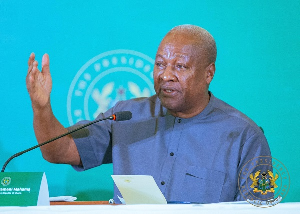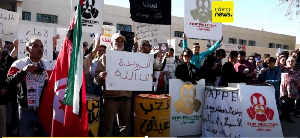Kumasi, Oct 4, GNA- The media have been advised to be courageous and report the truth to avoid tension in the country.
" Journalists should not inflame passions but must report the truth and nothing but the truth", Dr Anthony Bonnah Koomson, a lecturer at the School of Communications Studies, University of Ghana, Legon, said in Kumasi on Saturday.
Dr Koomson was speaking on the topic: "Evaluation of Election 2000 Coverage" and "Access to the Media and Ethnics in Election Reporting: Challenges of the Media" at a roundtable for peaceful 2004 election. It was organised by the Ghana Journalists Association (GJA) and sponsored by the United Nations Development Programme (UNDP) and the French Embassy for the media, political parties, traditional rulers, the clergy and the Electoral Commission (EC).
He said the Commonwealth Observer Group to the 1992 elections accused the Ghanaian media for not giving equal coverage and space particularly in the state media to all the political parties. Dr Koomson said there was some improvement in the 1996 coverage, but here again the Commonwealth Observer Group had some bad remark on the media. In 2000, he said, there was "tremendous improvement" in the reportage and that the media did their best in the coverage of the elections.
Dr Koomson however, described Ghanaian journalists, who take sides in elections as "shameful", and that the GJA had pointed out this to them on several occasions.
In a speech read for him, Mr Alfred Salia Fawundu, UNDP representative in Ghana, reminded journalists that there was no political party, which is more important than Ghana. That was why the framers of the 1992 constitution after reviewing the history of the country opted for a multi-party system of government, he said. He said this entailed tolerance, consideration of others views or standpoint, with the consideration of national interest at all times.
Mr Fawundu said the UNDP, French Embassy and the GJA put the programme together as a means of providing the media with continuing education and training to enable them to improve their contribution to national consensus building and peace-making in the country.
Mr Amponsah Asiamah, a Chief Superintendent of Police, asked the radio stations to work in close harmony with the police, especially on the election day, by informing the police about any happening at polling stations before going public. This, he said, would forestall any acts of violence or breach of the peace.
Mr I.K. Gyasi, a retired educationist, who moderated, said the media the success of the elections was the responsibility of all. That was why, he said, the media, police and political parties should co-operate. He told journalists that the ethics of the profession enjoined them not to publish untruth. Journalists should be very careful not to destroy somebody's hard won reputation since it is not easy to undo a damage done to person, he added.
Regional News of Monday, 4 October 2004
Source: GNA












